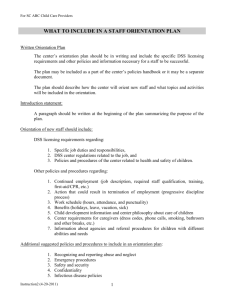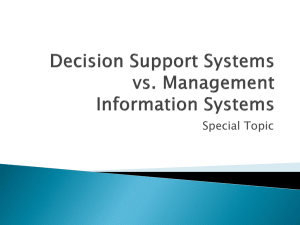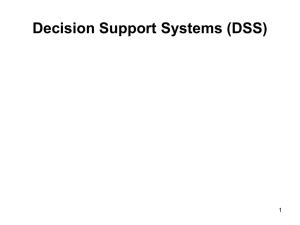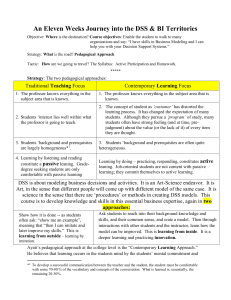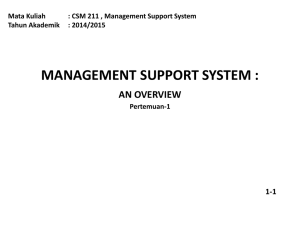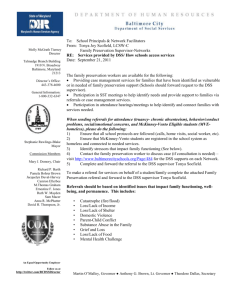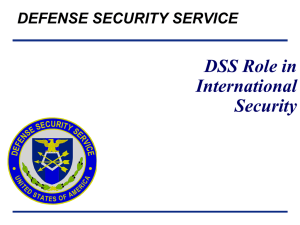Course Syllabus
advertisement
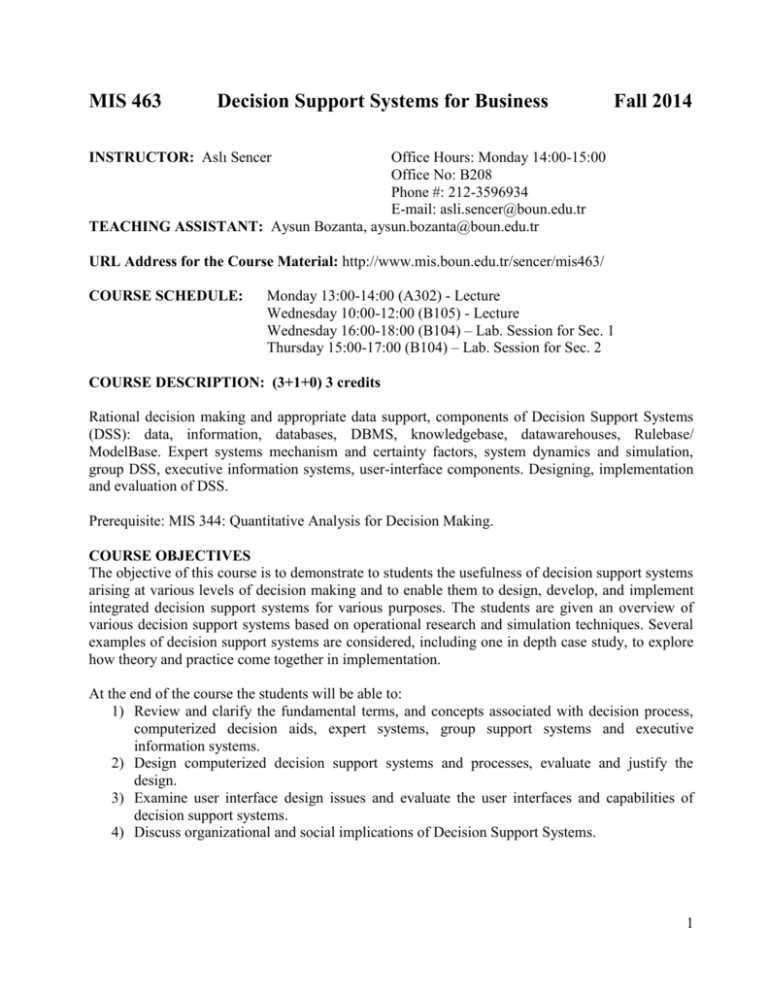
MIS 463 Decision Support Systems for Business Fall 2014 INSTRUCTOR: Aslı Sencer Office Hours: Monday 14:00-15:00 Office No: B208 Phone #: 212-3596934 E-mail: asli.sencer@boun.edu.tr TEACHING ASSISTANT: Aysun Bozanta, aysun.bozanta@boun.edu.tr URL Address for the Course Material: http://www.mis.boun.edu.tr/sencer/mis463/ COURSE SCHEDULE: Monday 13:00-14:00 (A302) - Lecture Wednesday 10:00-12:00 (B105) - Lecture Wednesday 16:00-18:00 (B104) – Lab. Session for Sec. 1 Thursday 15:00-17:00 (B104) – Lab. Session for Sec. 2 COURSE DESCRIPTION: (3+1+0) 3 credits Rational decision making and appropriate data support, components of Decision Support Systems (DSS): data, information, databases, DBMS, knowledgebase, datawarehouses, Rulebase/ ModelBase. Expert systems mechanism and certainty factors, system dynamics and simulation, group DSS, executive information systems, user-interface components. Designing, implementation and evaluation of DSS. Prerequisite: MIS 344: Quantitative Analysis for Decision Making. COURSE OBJECTIVES The objective of this course is to demonstrate to students the usefulness of decision support systems arising at various levels of decision making and to enable them to design, develop, and implement integrated decision support systems for various purposes. The students are given an overview of various decision support systems based on operational research and simulation techniques. Several examples of decision support systems are considered, including one in depth case study, to explore how theory and practice come together in implementation. At the end of the course the students will be able to: 1) Review and clarify the fundamental terms, and concepts associated with decision process, computerized decision aids, expert systems, group support systems and executive information systems. 2) Design computerized decision support systems and processes, evaluate and justify the design. 3) Examine user interface design issues and evaluate the user interfaces and capabilities of decision support systems. 4) Discuss organizational and social implications of Decision Support Systems. 1 TEXTBOOK: There won’t be a single textbook. As a reference, we will mainly use the followings: Efraim Turban and Jay E.Aronson, Decision Support Systems and Intelligent Systems, 7th. Edition, Prentice Hall International Editions, 2005 Şeref, M.H., Ahuja, R.K., Winston, W., Developing Spreadsheet-Based Decision Support Systems: Using Excel and VBA for Excel, Dynamic Ideas, 2007. (ISBN 0-9759146-5-0) There are several suggested references for decision support systems, applications with OR modeling and simulation. Decision Support Systems: Pol, A.A., Ahuja, R.K., Developing Web-Enabled Decision Support Systems: Using Access, VB.Net and ASP .Net, Dynamic Ideas, 2007. (ISBN 0-9759146-4-2) Vicki L. Sauter, Decision Support Systems : An Applied Managerial Approach. Wiley, 1996, (ISBN: 04-7131-1340) George M. Marakas, Decision Support Systems and Megaputer, 2nd Ed, Prentice Hall, 2002, (ISBN: 01-3101-8795) Simulation Modeling and Analysis: W. David Kelton, Rendall P. Sadowski, Deborah A. Sadowski, Simulation with Arena, 3rd. edition, Mc-Graw Hill, 2002. (chp. 1-6,10, App. D) Operations Research Modeling and Applications: Lapin, L., Whisler, W. D., “Quantitative Decision Making with Spreadsheet Applications”, 7th edition, Duxbury Press, 2001. Analytic Hierarchy Process Saaty, T., Vargas, L.G., "Models, Methods, Moncepts & Applications of the Analytic Hierarchy Process", Kluwer Academic Publishers, 2001. DESIGN CONTENT Lectures: Each week, theoretical concepts will be covered from the text books in the 3-lecture hours. You should be prepared to the lectures before coming to the sessions. Your participation and attendance will be graded. Theoretical lectures will be supported and enhanced by introducing DSS applications and cases. Labs and Prob-sessions: In the lab sessions you will study several DSS applications using MS-Excel, VB and VBA. Furthermore some simulation applications will be made by MS-Excel and Arena. A homework will be given as an application in Arena. 2 Project: You will prepare a project in groups of 4 students, where you will design, implement and evaluate a DSS application. The DSS should include a model base (either an OR model, or an AHP model or a simulation model) and a user interface with all the required features of a DSS. It may also include a database, or you may use excel environment for the inputs. Here are some guidelines for the project: 1) You will prepare a proposal, a midreport and a final report. The deadlines are very strict, one day late submission of the proposal, midreport and final report will result in 20 points of decrease in your grade. 2) You will make 3 presentations in the class, i.e., the proposal and the mid report presentations will be 10-15 min. whereas the final presentation will take 20 min. 3) The templates of the reports, sample DSS projects, related websites and the deadlines of the project will be given on the course web page, so you are responsible for checking the latest updates. 4) It is optional to prepare the project in groups of size 5, however this requires further work, i.e., the DSS should be designed in a web based environment. 5) Students whose project grades are less than 50 are not allowed to enter the final exam and they receive F. Attendance: It is hard to follow and fulfill the requirements of this course without attending to the lectures properly, so attendance is an integral part of the evaluation and will be taken randomly. Attendance will be a part of the evaluation. Academic Dishonesty: Please note, and adhere to, the following policy. "We, the members of the Boğaziçi University community, pledge to hold ourselves and our peers to the highest standards of honesty and integrity." All forms of academic dishonesty will result in an F for the course and notification of the Academic Dishonesty Committee. Academic dishonesty includes (but is not limited to) plagiarism, copying answers or work done by another student (either on an exam or on out-of-class assignments), allowing another student to copy from you, and using unauthorized materials during an exam. Plagiarism: You must clearly indicate any and all instances where your work includes, is based on, or is derived from the work of others. Any violations are sufficient to receive a failing grade. Evaluation: Attendance Homework Project Final 5% 5% 70% 20% Final Exam: Final exam covers all the topics and a student who gets a lower grade than 50 fails (receives F) in this course, no matter what the project grade is. So be careful about the final exam! Resit Exam: Students who fail after the final exam are given a last chance of passing in the resit exam. 3 COURSE OUTLINE Week Topic Textbook Turban, Sauter, Chp.1,2,3. Şeref, Ahuja, Winston, Chp.1. 1 Management Support Systems: An Overview 2 Review of Operations Research Models for DSS’s Analytic Hierarchy Process -Submission of the Names of the Project Team Members (October 3, 5p.m.) 3 Kurban Bayramı-No Lectures on Monday 4 Analytic Hierarchy Process 5 -Submission of the Project Proposals (October 20, 1p.m) -Presentation of the Proposals in Class (October 20, 22) 6 Cumhuriyet Bayramı- No lecture on Wednesday 7 Simulation Modeling Kelton&Sadowski 8 Simulation Modeling Kelton&Sadowski 9 Simulation Modeling Kelton&Sadowski 10 - Submission of the Project Mid-report (November 24, 1 p.m.) -Presentation of the Project Mid-report in Class (November 24, 26) DSS Development Process 11 GUI Design and Programming Principles 12 Data Mining–Introduction (Wednesday lecture+1 hour extra) 13 Data Mining–Clustering, Association, Application 14 -Submission of the Project Final-report (December 22, 1p.m.) -Presentation of the Final Project in Class (December 22, 24) Data Mining Lab. (Lab. Hours on Tuesday) Lapin & Whisler Saaty Saaty Şeref, Ahuja, Winston, Chp.22 Şeref, Ahuja, Winston, Chp.23, 24 Lecture Notes of Bertan Badur Lecture Notes of Bertan Badur 4
